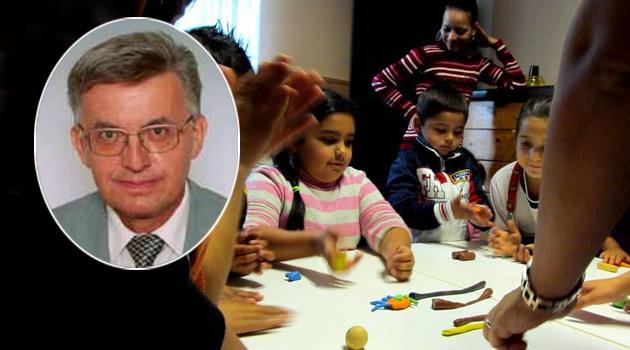Czech EdMin protests Brussels' criticism, AI confirms Roma are discriminated

New requirements from the European Commission regarding the education of Romani children in the Czech Republic have prompted a great outcry. Both the Czech Education Ministry and several NGOs that have long been involved in the problem have responded to the news.
The Commission has turned to the Czech Republic with a request for information regarding the alleged discrimination of Romani children in the Czech education system, consisting primarily of the disproportionate enrollment of such pupils into the "practical" and "specialized" schools, which serve children with mental disabilities. Prague must respond to the request within two months while the Commission decides what to do next; the proceedings could end up before the European Court.
Czech Education Minister Chládek: Pro-inclusive measures are happening
The Czech Education Ministry has responded on its website by referring the Commission to the actions of the previous administration. In a press release, the ministry claims that the current government is devoting exceptional attention to ensuring equal access to education for all children, pupils and students.
The Commission is complaining to the Czech Republic about its current legislation, drafted by the previous administration, which facilitates the enrollment of pupils into "practical" schools. The current leadership reportedly is introducing an amendment to the School Act that will significantly support pro-inclusive steps, some of which will begin to apply as of the next school year.
"Immediately after taking office at the Education Ministry, I initiated the establishment of a fund to expand the capacity of the public nursery schools so they can be accessed by all children equally. At the same time, preparatory classes in the primary schools will be open to all children, not just to those from socially excluded environments. I consider these steps to be the most pro-inclusive when it comes to including Romani children into mainstream education," Minister Chládek said.
"The earlier all children are enrolled, the better they will be prepared for the transition to mandatory school attendance. Making the last year of preschool mandatory is related to this also, I consider that to be an exceptionally pro-inclusive measure," said the Education Minister.
According to the Open Society Fund Prague, however, there is a need to introduce many other measures. "We hope that this decision by the European Commission will convince the government to make ending the discrimination of Romani children a higher priority," said its director, Robert Basch.
Steps in practice do not correspond to inclusion
Chládek recently named former Czech Education Minister Eduard Zeman to the newly-created post of Education Ombud, and Zeman does not consider the operations of the "practical schools" and the unjustified enrollment of Romani children into them to be a problem. In an interview for the Radiožurnál radio station, the incoming ombud said he considers the "practical schools" to be a Czech specialty and didn’t see anything wrong with them.
Zeman also claimed in that interview that Romani people in the Czech Republic are better-off than Roma in other countries. The Czech Green Party, meanwhile, is criticizing the government’s proposed amendment to the School Act, saying that its aim is "to enroll into the ‘practical schools’ pupils who would be able, with aid, to complete mainstream primary school, as well as pupils from different cultural or social environments."
The Education Ministry rejects that analysis of its legislation. Given the too-vague formulation of one of its sections, however the EDUin group and other experts believe that if the amendment is adopted, there will still be a risk of children without mental disability being enrolled into the "practical schools".
AI: Denial of the right to a quality education
Amnesty International has long pointed to this problem in the Czech system. Nicolas Beger, head of its Brussels office, and Mark Martin, director of AI in the Czech Republic, have now released statements on it again.
Both stated that "Amnesty International has been documenting the systematic violation of the rights of Romani children to access education in the Czech schools for years. Enrollment into ‘practical schools’ denies them the right to a quality education, limits their future choices of employment, and keeps them in the vicious circle of exclusion and marginalization. Despite this, the Government has not yet managed to adopt effective measures to address this situation and correct it."
The initiation of an infringement procedure by the European Commission is, according to AI, an historically significant step. This is the first case in which such a proceeding has beeen launched for violation of antidiscrimination legislation.
European Commission: Equal treatment is lacking
The Commission has called on the Member States on various occasions to ensure Romani children’s access to quality education. At the end of last year, Brussels also emphasized the need for equal treatment and the termination of segregation in education in its recommendations to the Member States.
This year the Commission also told the Member States there is a need for greater inclusion of both Romani children and socially disadvantaged children, primarily in the earliest grades of school. "Discrimination in schools on the basis of ethnic origin is a serious matter that is banned by European law," said Commission spokesperson Joshua Salsby.
The Council of Europe also called last year for greater efforts to improve the position of Romani people, reminding governments that the segregation of Romani children in the schools remains a serious problem. In 2007 the European Court of Human Rights in Strasbourg came to the conclusion that the Czech Republic discriminates against Romani children by disproportionately sending them to schools for the mentally disabled.